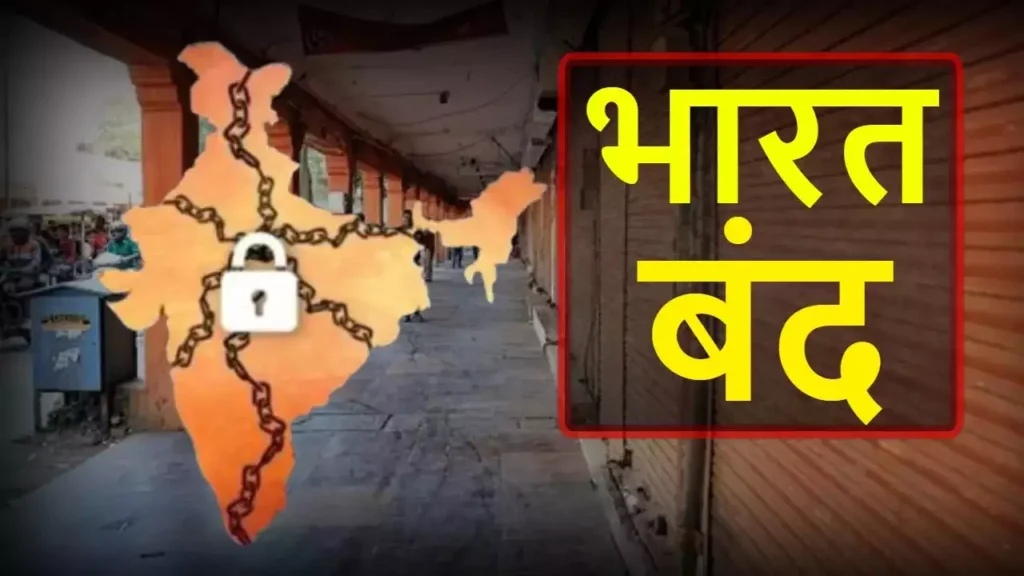Introduction:
In recent times. The socio-political landscape of India has been marked by significant movements and protests. With one of the most prominent being the ongoing farmers’ agitation. At the heart of this agitation is the demand for reforms in agricultural laws and guarantees for minimum support prices (MSP) for crops. Amidst this backdrop, the call for Bharat Bandh, a nationwide strike, has garnered attention as a display of solidarity and protest against the government’s policies. In this article, we delve into the intricacies of Bharat Bandh, its implications on various sectors. And the underlying issues fueling the protest.
The Genesis of Bharat Bandh:
Bharat Bandh, literally translating to “India Strike,” is a form of protest where various sectors of society come together to observe a nationwide strike. The purpose is to demonstrate dissent and demand attention towards pressing issues affecting the nation. In the current scenario, Bharat Bandh has been called by farmers’ organizations, particularly the Samyukt Kisan Morcha, along with support from central trade unions.

Farmers’ Protest and Bharat Bandh:
The Bharat Bandh call coincides with the ongoing farmers’ protest, which has been ongoing for over a year. The farmers have been demanding the repeal of three controversial farm laws passed by the government and the implementation of MSP for agricultural produce. The nationwide strike serves as a means for farmers to amplify their voices and exert pressure on the government to address their grievances.
Nationwide Impact:
The impact of Bharat Bandh extends beyond the agricultural sector, affecting various facets of daily life. From transportation to commerce, the strike disrupts normalcy and draws attention to the underlying issues. Toll booths remain free. Offices may shut down. And transportation services may be disrupted as a result of the strike. The solidarity exhibited during Bharat Bandh reflects the collective dissatisfaction with prevailing policies and governance.
Government Response and Dialogue:
In response to the farmers’ agitation and Bharat Bandh, the government has engaged in dialogue with farmer representatives to address their concerns. However. The negotiations have been met with challenges. Including disagreements over the proposed solutions. Despite multiple rounds of talks, a consensus remains elusive, prolonging the standoff between the government and farmers.
Socio-Economic Ramifications:
The BharatBandh and farmers’ protest have significant socio-economic ramifications. While the strike highlights the resilience and unity of various sectors, it also underscores the vulnerability of marginalized communities dependent on agriculture for their livelihoods. The prolonged agitation has disrupted supply chains, impacted markets, and raised concerns about food security and rural welfare.
Legal and Political Dimensions:
The legality of BharatBandh and its implications within the legal framework raise pertinent questions. While the right to protest is enshrin in the constitution. The disruption caused by nationwide strikes raises concerns about public order and governance. The political landscape is also influence by the protest. With parties aligning themselves with or against the farmers’ cause base on ideological and electoral considerations.
Future Outlook:
As Bharat Bandh unfolds and the farmers’ protest continues, the future outlook remains uncertain. The resilience of the protestors and the government’s response will shape the trajectory of the movement and its outcomes. The need for constructive dialogue, empathy, and equitable solutions underscores the path forward towards resolving the impasse and addressing the underlying issues affecting the agrarian community.
Also Read : “Unrest at Punjab-Haryana Border: Farmers’ ‘Delhi Chalo’ March Escalates”
Conclusion:
Bharat Bandh serves as a potent expression of dissent and solidarity. Amplifying the voices of marginalized communities and underscoring the need for inclusive governance and policy reform. As the nationwide strike unfolds. It reflects the collective aspirations for a more just and equitable society. Where the concerns of all citizens. Especially those dependent on agriculture. Are heard and address.





